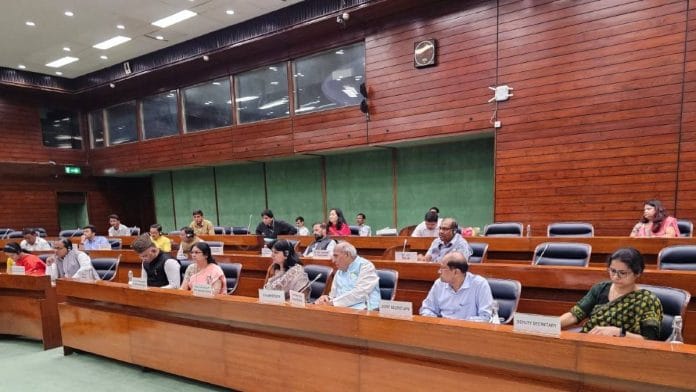New Delhi: At the second meeting of the Joint Parliamentary Committee (JPC) on the Waqf (Amendment) Bill Friday, the opposition parties questioned the provision mandating that only those who have been “practising Islam for five years” can give their property for charitable use.
The Bill, which was tabled in Parliament earlier this month, proposes 44 amendments to the Waqf Act of 1995 for “effective management” of waqf properties and to “enhance efficiency” of waqf administration.
The Modi government has proposed to replace a provision in the 1995 Act allowing “any person” to give his/her property for waqf use with “any person practising Islam for at least five years”.
Sources say that the opposition MPs asked “who will decide if a person has been practising Islam for five years or not”. The proposed change has been questioned by several Islamic organisations as well.
MPs from the Aam Aadmi Party, the Trinamool Congress, and the All India Majlis-e-Ittehadul Muslimeen (AIMIM) also said the government should not interfere in religious matters. This was regarding the proposed inclusion of non-Muslims in state waqf boards and the Central Waqf Council.
It is learnt that the MPs cited court orders which said there should be minimum government interference in religious matters.
The issue of giving absolute powers to district collectors in waqf property matters was also raised in the meeting by the opposition leaders. A JPC member said that many members questioned the government’s intent and said it should not interfere in waqf matters as the land was not provided by the government.
They also alleged that the Bill has provisions that are “unconstitutional” and “not in the interests” of the Muslim community.
On Friday, some of the Muslim organisation and state waqf board members also conveyed to the JPC their views on the Bill.
In a post on ‘X’, BJP MP and chairman of the 31-member JPC Jagdambika Pal said: “The Joint Committee on the Waqf (Amendment) Bill, 2024, met in New Delhi today and heard oral evidence from stakeholders including All India Sunni Jamiatul Ulama Mumbai, Indian Muslims for Civil Rights (IMCR), Delhi and Uttar Pradesh Sunni Central Waqf Board and Rajasthan Muslim Waqf (sic).”
Sources said that some of the organisations conveyed their opposition to the proposed amendments to the committee and appealed that the Bill be scrapped.
Raza Academy, a Sunni Barelvi organisation of Indian Sunni Muslims whose members were part of the delegation, posted on ‘X’ that it had appealed for the Bill to be scrapped.
“A delegation led by Hazrat Moin Miyan Sahab president All India Sunni Jamiatul Ulema met the JPC members of Waqf Amendment Bill 2024 in New Delhi today and conveyed their strongest opposition to the amendment bill and appealed to scrap the Bill in totality,” the post said.
It added that the president of Raza Academy along with others presented a memorandum to the JPC, highlighting the “glaring legal blunders in the proposed bill”.
“We hope that the Indian government shall take into consideration the concerns of the community and scrap the bill completely,” the post said.
A second JPC member said chairman Pal objected to one lawyer representing most of the organisations which had come to present their views on the subject. The member added there was no point in objecting to this as organisations were free to rope in any lawyer.
On the provision for non-Muslims to be part of state waqf boards and the Central Waqf Council, the JPC member said that the opposition MPs raised the point that there were many endowments laws in states for temples, and that non-Hindus were not allowed to be part of temple boards, and even Sikh and Jains were not allowed.
Meanwhile, the JPC has invited views and suggestions from the general public and experts, among others, within 15 days (by 15 September) regarding the proposed amendments.
(Edited by Nida Fatima Siddiqui)
Also Read: How Modi govt is proposing to amend Waqf Act & why critics call it harbinger of ‘Collector Raj’







There is no place for government to interfere in religious matters, except passing laws that give religious bodies unlimited authority for grabbing land it seems.
What role does governement have in deciding to whom I donate my private property? Taking away way the rights of private property owners is an agenda of left wing extremism practisced during communist times. Surprising that BJP will go to such length to disturb Muslims.
It’s unfortunate. Seems like history is repeating itself.
During the Shah Bano case, Mohd. Arif Khan staunchly opposed the mullahs and batted on behalf of a modern and progressive Muslim society. He had to resign from Congress for having the guts to stand up to the regressive mullahs.
This time around, it seems like there is not a single Muslim politician to oppose the grossly unreasonable demands of the Muslim clergy. Muslim clergy has held Muslim society to ransom for far too long. They are the reason why Muslim society is stuck in the past and unable to keep pace with modernity.
Opportunists and narcissists like Asaduddin Owaisi will always play to the gallery and appease the Islamic clergy to ensure they get elected to the Lok Sabha again and again.